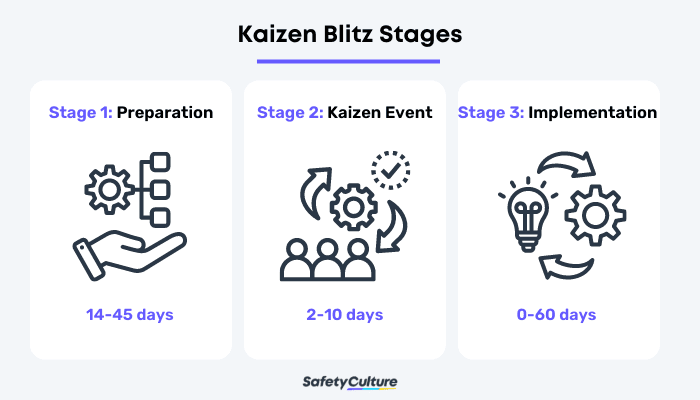What is Kaizen Blitz?
Kaizen blitz, also known as kaizen event, is a small but comprehensive and actionable effort to identify areas for improvement in a business process and quickly implement recognized solutions effectively. As a short-term process-improvement approach, it involves fewer people, is executed within a few days, focuses on a specific area, and intends to show visible results in a short period of time.
Kaizen blitz follows the concept of the improvement cycle DMAIC (Define, Measure, Analyze, Improve, and Control) which improves business processes using data-driven techniques. Their main difference, however, is that while the cycle of DMAIC can span for months, kaizen blitz is—with “blitz” suggesting something that is quick and intense—characterized by its short duration and speedy implementation.
Why Use It?
Businesses use the kaizen blitz method for continuous process improvement and better team performance. Choosing to apply this method among many other tools not only leads to significant, visible, and measurable improvements but also offers the following key benefits and advantages:
- uses simple tools and processes
- encourages collaboration
- encourages high level of commitment
- highlights quick decision making
- implements feasible solutions
- delivers immediate results
- bases success on data and analysis
Difference Between Kaizen and Kaizen Blitz
Kaizen is a Japanese term which means “change for the better”, “continuous improvement”, or simply just “improvement”. It is a widely-used business philosophy designed to improve operations and internal processes. Blitz, meanwhile—is a term originating from the German word “blitzkrieg” which means a “sudden and concerted attack” or an “intensive overwhelming force.”
In the business perspective, kaizen blitz can therefore be defined as a sudden intensive effort to dismantle a process, analyze its weakness, and rebuild it back to form something better. But what is its main difference to the kaizen method?
Businesses incrementally implement kaizen on a bigger scale, it involves several other principles, and it could often take a while before the initiative reaches a significant result. Kaizen blitz, on the other hand, is a quick “event” that applies the concept of kaizen to solve a specific problem while also aiming for a tangible solution in a short period of time.
Stages
The kaizen blitz is divided into three major stages and each stage involves multiple other steps and activities that contribute to a successful conclusion of the project. Learn more about the kaizen blitz stages and steps in the following:

Kaizen Blitz Stages
1. Preparation
This stage is also called pre-kaizen preparation and normally lasts from 14-45 days. Preparation is where issues and problems that require immediate attention are stated and identified. Aside from that, it also includes the following steps:
- Identity a sponsor/s from top management
- Define the scope of the problem/process to be addressed
- Set SMART—Specific, Measurable, Achievable, Relevant, Time-bound—objectives and identify boundaries
- Select the team leader and team members and assemble a meeting
- Collect data and available information relevant to the problem
2. Kaizen Event
As the name suggests, this stage is the actual kaizen blitz where team members and relevant stakeholders gather to focus and improve certain business processes. This stage can last from 2-10 days on average and requires you to do the following activities:
- Train members on blitz process
- Review the current situation
- Identify key issues (vs the objectives)
- Collect and analyze data (engage with customers and stakeholders)
- Develop workable and high impact solutions
- Validate and implement solutions
- Put together a summary of the analysis
- Prepare plan for continuous implementation
- Present recommendations and gain approval from sponsor/s and other stakeholders
3. Implementation
Also sometimes referred to as Follow-Up, Implementation is the blitz stage after the kaizen event. This stage can last from 0-60 days depending on the complexity of the project, this includes the following activities:
- Keep implementing the solutions for continuous improvement
- Coordinate process changes to stakeholders and all employees
- Measure success and project benefits
- Submit project achievements to sponsor/s or top management
Digitize the way you Work
Empower your team with SafetyCulture to perform checks, train staff, report issues, and automate tasks with our digital platform.
Get Started for FreeElements of a Successful Kaizen Blitz Implementation
Measurement of success can vary based on the identified problem and techniques used but a successful kaizen blitz project should generally include:
Critical issue
The problem to be addressed should be an issue that everyone involved considers critical and should therefore be prioritized. This way, it would be easier to form a robust kaizen blitz team and get everyone onboard the project.
Focused approach
Ensure a data-based method and analysis to enable the team to come up with actionable solutions. Use a prioritization matrix to help identify which ideas from the team can yield the most appropriate and efficient results.
For a more data-driven approach, you can also make use of problem-solving tools such as the Root Cause Analysis, 5 Whys, and 5W1H or a practical approach of applying the Gemba Walk.
Cross-functional team
Since blitz is a short-term initiative, form a team with specific functions who can do their tasks efficiently. Objectives, boundaries, and constraints should also be clear so all people involved know how to best contribute to reach the shared goals.
Participation of decision-makers
Active participation of top management not only boosts the morale of the team but also empowers them to take actions and make decisions. Consistent perspective straight from decision-makers as the event advances also helps ensure a progressive result.
Aside from the above-mentioned elements, businesses and teams that practice the kaizen blitz method can also make use of new technologies to ensure continuous process improvement.




